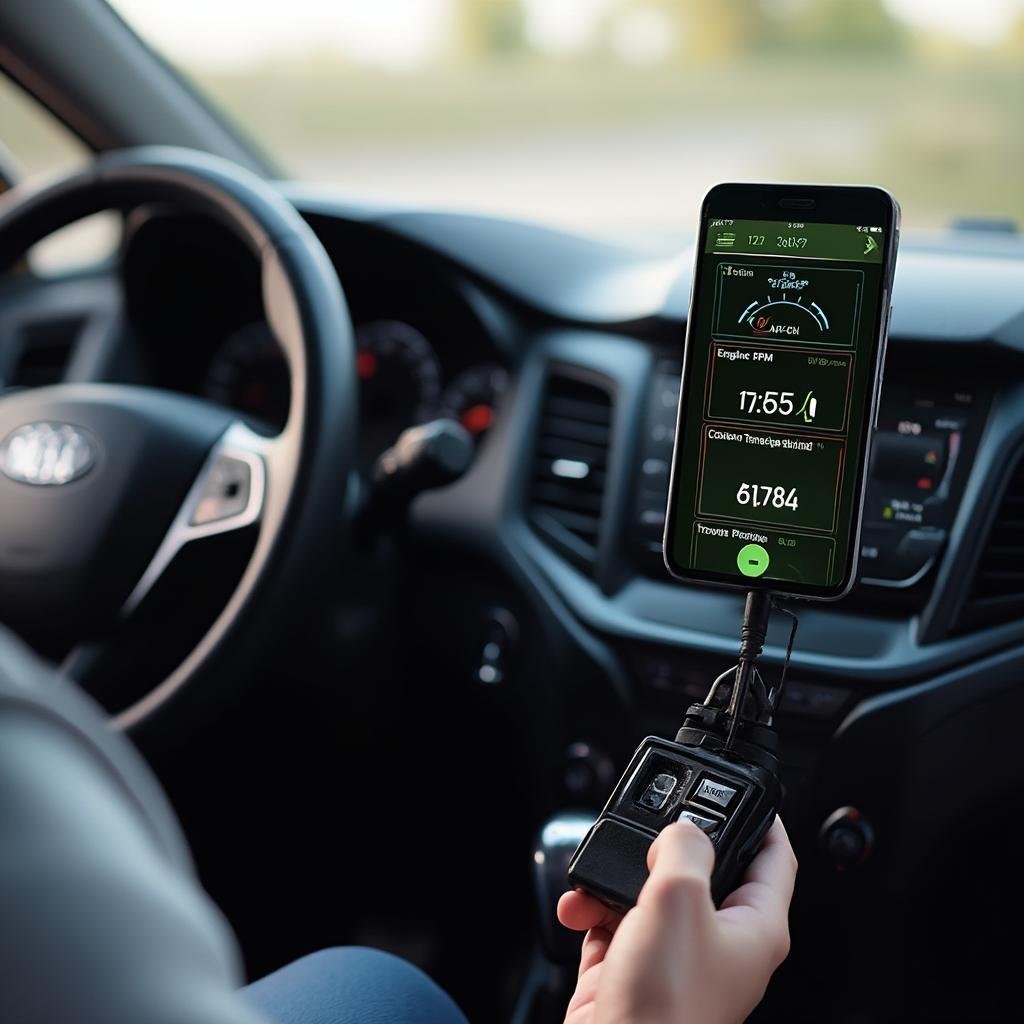An OBD2 scanner can be more than just a diagnostic tool; it can be a key to unlocking your car’s hidden performance potential. By understanding how to use an OBD2 scanner effectively, you can gain valuable insights into your vehicle’s operation and make informed adjustments to enhance its performance. This article will explore the various ways you can leverage an OBD2 scanner to fine-tune your car’s performance. After reading this article, you will be able to utilize an OBD2 scanner to monitor real-time data and identify areas for improvement.
Understanding the Power of OBD2 Scanners
OBD2 scanners offer a window into your car’s engine control unit (ECU), providing access to a wealth of data that can be used to diagnose problems and optimize performance. By reading and interpreting this data, you can identify areas where adjustments can be made to improve horsepower, torque, fuel efficiency, and overall drivability. This process can involve monitoring various parameters like engine speed, throttle position, fuel pressure, and air intake temperature, among others.
Check out our carly obd2 scanner review to learn more about this useful scanner.
How to Monitor Real-time Data for Performance Tuning
Most OBD2 scanners allow you to monitor real-time data streams from various sensors in your vehicle. This information can be invaluable in understanding how your engine is performing under different driving conditions. By observing parameters like air/fuel ratio, ignition timing, and boost pressure (for turbocharged engines), you can identify potential bottlenecks and areas for improvement.
Using OBD2 Scanners to Identify Performance Issues
Beyond real-time data monitoring, OBD2 scanners can also be used to diagnose specific performance issues. By reading and clearing diagnostic trouble codes (DTCs), you can identify malfunctions in various systems that may be impacting performance. For instance, a faulty oxygen sensor can negatively impact fuel efficiency and power output. Addressing these issues can lead to significant performance gains.
Advanced OBD2 Functions for Performance Enhancement
Some advanced OBD2 scanners offer features beyond basic diagnostics and real-time data monitoring. These can include data logging, which allows you to record data over time for later analysis, and bi-directional controls, which enable you to activate certain components like fuel injectors or solenoids for testing and adjustment. These functionalities provide a deeper level of control and analysis, allowing for more precise performance tuning. You can learn more about OBD2 programming with our resource on obd2 programming language.
Fine-tuning Your Car with an OBD2 Scanner
Using an OBD2 scanner to adjust performance requires careful consideration and understanding of your vehicle’s systems. Modifying certain parameters without proper knowledge can potentially damage your engine. It’s recommended to consult with a qualified mechanic or tuning specialist, especially when dealing with advanced adjustments. For specific vehicle information, you can find resources like the location of the OBD2 connector in a Honda Civic on our website: ubicasion del conector obd2 en honda civic.
Common OBD2 Parameters for Performance Adjustment
Several key parameters can be monitored and adjusted using an OBD2 scanner to improve performance. These include:
- Air/Fuel Ratio: Adjusting the air/fuel ratio can optimize combustion efficiency and power output.
- Ignition Timing: Fine-tuning the ignition timing can improve throttle response and power delivery.
- Boost Pressure (Turbocharged Engines): Monitoring and adjusting boost pressure can optimize turbocharger performance.
How to Avoid Common Mistakes When Adjusting Performance with OBD2 Scanners
- Over-adjusting Parameters: Making drastic changes without understanding the implications can negatively impact engine reliability.
- Ignoring DTCs: Addressing underlying issues indicated by DTCs is crucial for optimal performance.
- Using the Wrong OBD2 Scanner: Ensure compatibility with your vehicle and the desired functionality. Check out our review on the super mini elm327 bluetooth obd2 v2.1 car diagnostic interface tool for a reliable and affordable option.
- Not Consulting a Professional: For complex adjustments, seeking professional guidance is highly recommended. Remember, knowledge is power, especially when it comes to tuning your car’s performance with an OBD2 scanner.
Conclusion
Learning how to adjust performance with an OBD2 scanner can be a rewarding experience, allowing you to unlock your car’s full potential. By understanding the data provided by your OBD2 scanner and using it wisely, you can make informed decisions to enhance performance, fuel efficiency, and overall drivability. However, proceed with caution and consult with a professional when necessary to avoid potential damage to your vehicle.
FAQ
- Can any OBD2 scanner adjust performance? No, some only read codes while others offer advanced features.
- Is it safe to adjust performance parameters myself? For basic adjustments, yes, but complex changes require professional help.
- What are the risks of improper adjustments? Potential engine damage or decreased performance.
- Where can I find more information about my car’s specific OBD2 parameters? Consult your vehicle’s service manual or a qualified mechanic.
- What are some recommended OBD2 scanners for performance tuning? Research scanners with advanced features and compatibility with your vehicle.
- How can I log data from my OBD2 scanner? Some scanners have built-in data logging features, or you can use third-party software.
- What is the best way to interpret the data from my OBD2 scanner? Research and understand the specific parameters relevant to your vehicle’s performance.
Need support? Contact us via WhatsApp: +1(641)206-8880, Email: cardiagtechworkshop@gmail.com or visit us at 789 Elm Street, San Francisco, CA 94102, USA. We have a 24/7 customer support team ready to assist you. We also have other resources on bmw motorrad obd2 available on our website.
